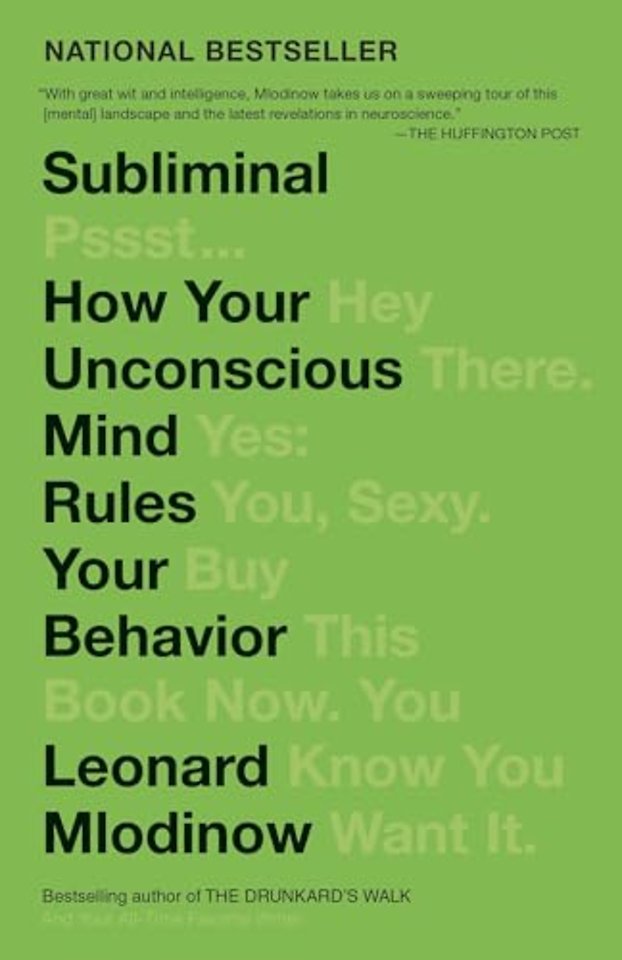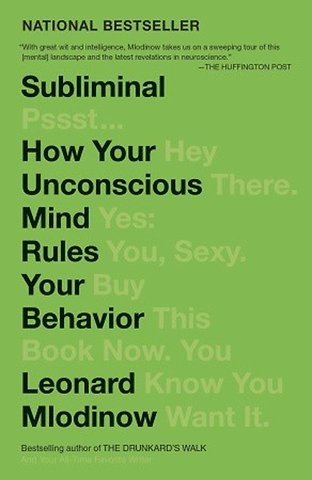


Leonard Mlodinow is natuurkundige, woont in New York, doceert aan Caltech en schrijft populair-wetenschappelijke boeken, zoals, met Stephen Hawking, A Briefer History of Time.
Meer over Leonard MlodinowSubliminal
How your unconscious mind rules your behavior
Samenvatting
Of het nou gaat om uw politieke voorkeur, een sollicitant aannemen, hoeveel fooi u geeft, met wie u samenleeft of welk merk deodorant u koopt: de ware toedracht van onze keuzes ligt ingewikkelder dan we denken. In 'Subliminal' doet Leonard Mlodinow verslag van de verrassende en verbijsterende manieren waarop we onbewust beïnvloed worden, en wat we daarvan kunnen leren.
De afgelopen twee decennia hebben onderzoekers de verborgen, onbewuste werking van ons brein op vele manieren gemeten. Zo is gebleken dat we andere beslissingen nemen na het zien van een vrolijke film, dat we ons dingen kunnen herinneren die nooit gebeurd zijn en dat niet alleen ons gedrag, maar ook de financiële markt wordt beïnvloed door zonlicht.
In zijn kenmerkende, heldere en meeslepende stijl vertelt Mlodinow over het uitgebreide onderzoek naar dit onderwerp. Na het lezen van dit boek snapt u waarom u eigenlijk het werk doet dat u doet en waarom u bijvoorbeeld dit boek gekocht hebt. Maar vooral leert u hoe u deze inzichten kunt inzetten om uzelf en anderen te beïnvloeden.
Specificaties
Inhoudsopgave
PART I: The Two-tiered Brain
1. The New Unconscious: The hidden role of our subliminal selves . . . what it means when you don't call your mother
2. Senses Plus Mind Equals Reality: The two-tier system of the brain . . . how you can see something without knowing it
3. Remembering and Forgetting: How the brain builds memories . . . why we sometimes remember what never happened
4. The Importance of Being Social: The fundamental role of human social character . . . why Tylenol can mend a broken heart
Part II: The Social Unconscious
5. Reading People: How we communicate without speaking . . . how to know who's the boss by watching her eyes
6. Judging People by Their Covers: What we read into looks, voice, and touch . . . how to win voters, attract a date, or beguile a female cowbird
7. Sorting People and Things: Why we categorize things and stereotype people . . .what Lincoln, Gandhi, and Che Guevara had in common
8. In-Groups and Out-Groups: The dynamics of us and them . . . the science behind Lord of the Flies
9. Feelings: The nature of emotions . . . why the prospect of falling hundreds of feet onto large boulders has the same effect as a flirtatious smile and a black silk nightgown
10. Self: How our ego defends its honor . . . why schedules are overly optimistic and failed CEOs feel they deserve golden parachutes
Acknowledgments
Notes
Index
Anderen die dit boek kochten, kochten ook
Net verschenen
Rubrieken
- aanbestedingsrecht
- aansprakelijkheids- en verzekeringsrecht
- accountancy
- algemeen juridisch
- arbeidsrecht
- bank- en effectenrecht
- bestuursrecht
- bouwrecht
- burgerlijk recht en procesrecht
- europees-internationaal recht
- fiscaal recht
- gezondheidsrecht
- insolventierecht
- intellectuele eigendom en ict-recht
- management
- mens en maatschappij
- milieu- en omgevingsrecht
- notarieel recht
- ondernemingsrecht
- pensioenrecht
- personen- en familierecht
- sociale zekerheidsrecht
- staatsrecht
- strafrecht en criminologie
- vastgoed- en huurrecht
- vreemdelingenrecht





